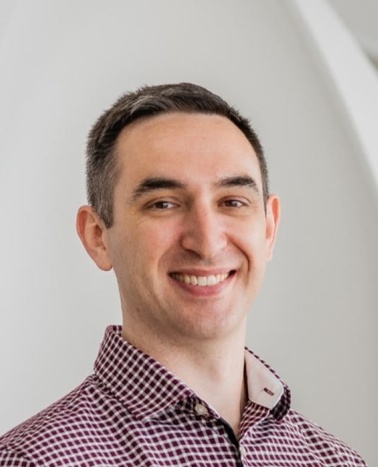
Graham Blake
I'm from Dublin, Ireland but have been living in Basel, Switzerland since 2017. I'm married with one daughter Mia, who’s nearly four years old. In my spare time I play football for a local team in Basel, and the rest of my free time is spent bringing my daughter to/from her various activities, like swimming and football.

“Focusing on what you want by being brutally honest with yourself will make you much more comfortable with who you are, and this will be reflected in your work.”
Your background is in project management within the pharmaceutical industry. Tell us more about your academic and career journey.
I graduated with a BSc. in pharmacology. My first professional role was working for IQVIA (then Quintiles)—one of the largest clinical research organizations that provide expertise to the pharmaceutical industry—in a graduate program in clinical data management. I became a project lead and worked on clinical trials of numerous pharmaceutical companies. During this time I started a part-time master’s in Project Management at University College Dublin.
I then spent some time at Mylan, a generic manufacturer of pharmaceutical products, in their European business. I split my time between Dublin and Lyon and learned a vast amount about the different European generic markets.
I then moved to Novartis in a new, global office they had set up in Dublin. I worked in their main R&D division as program operations manager. This was a mixed role of project and finance management, supporting the asset teams that develop future medicines for patients. I have personally worked on Kesimpta for patients with Multiple Sclerosis and Galvus/Eucreas for Type II Diabetes patients.
In 2017, I moved to Switzerland to work as a global project manager for Roche in their early research and development. This move capped my complete, end-to-end experience working in R&D, from the earliest basic research through to marketed products. I spent some time both with drug development teams and doing broader portfolio work, including a rotation in the Diagnostics division.
I was fortunate enough to be sponsored by my company to pursue the Executive MBA at IE University, and I started in 2021. This was enough of a challenge already and on top of that I moved into finance within Roche in 2022. I’m still there—I’m currently the finance head of one of the early research and development therapeutic units; Neuroscience & Rare Disease.
What does your current role as a global finance enterprise partner at Roche entail?
I’m responsible for the financial performance of the Neuroscience & Rare Disease early R&D portfolio. This has dozens of assets in both drug discovery and clinical development. There are many moving parts, as assets that early in the product development funnel fall out of the portfolio frequently. So I need to work with many different teams, from the scientists and medics to the operations and leadership teams. I have to keep up with the various scientific targets of interest, the portfolio movements and the broader strategic direction of the company to offer the best possible support to the unit and its teams. I’m also part of M&A teams when we’re pursuing external neuroscience opportunities.
What motivated you to study the Executive MBA?
I had focused the earlier part of my career very much on R&D and project management. This gave me deep expertise in that area, but I felt I lacked broader exposure to how a global business works and the skills needed to thrive in that context. I also wanted to challenge myself and get out of my comfort zone by looking for larger roles within my current company.
What was your focus for your Final Leadership Project?
It was a team effort, building an app that would connect people (primarily women) with others who wanted to connect professionally, in person, using female-friendly hotels and dining options.
How did you approach the idea of corporate sponsorship with your company?
I first approached my manager at the time, who had always been very supportive of my career. With his backing I put together a narrative for my leadership team, highlighting the benefits of a part-time Executive MBA that I could utilize immediately in my current role.
How has corporate sponsorship mutually benefited both you and your employer? Can you give a specific example?
It gave my employer someone who has greatly bolstered their business acumen, grown their strategic agility (for example, moving from a project management to a finance leadership role) and developed their leadership skills, which has already helped others. It gave me the confidence that I was seen as a valued employee with lots of growth potential for a career within the company, in addition to removing a large financial burden.
During the Executive MBA. How did you manage the challenges of balancing your work and academic responsibilities?
It was difficult, especially with a very young child at the time. I had to be disciplined with my use of time, take advantage of any unexpected free time and learn to be less of a procrastinator! I also had massive support from my partner; it would not have been possible without her backing.
In what ways did the Executive MBA help you become a more effective leader?
I learned a lot about myself, my habits, where I’m strong and where I’m not so strong. It was a humbling experience to be surrounded by so many other talented and motivated people during the Executive MBA. I used this to become a more rounded professional who can recognize their own failings instead of hiding them, and who can use my strengths to the benefit of others, not just myself.
How did your learnings from the Executive MBA help you to shift into your current role as part of a leadership team?
Much of the Executive MBA's group work reflects the dynamic of many leadership teams. There are varied personalities, and being able to recognize and work effectively with them has really helped me. The program was also a strong signal within my company that I was someone who could adapt to new challenges and thrive. Finally, the basic building blocks of the Executive MBA; accounting, operations, strategy etc., gave me a much better understanding of the needs of different roles, which I could demonstrate in interviews.
What new perspectives on your purpose and career did you gain through the Executive MBA?
My biggest reflection was that it’s always better to do something rewarding than purely for material gain. Focusing on what you want by being brutally honest with yourself will make you much more comfortable with who you are, and this will be reflected in your work.
Since graduation, what benefits have you gained from the diverse, global network that IE Business School provides access to, whether through your peers and the faculty, or with events such as Global Immersion Week?
I now have a close-knit professional network from my class in 20+ countries around the world. Any question or inquiry about a new company or role gets an answer right away, either directly from the class or somebody has a contact for you. Not to mention friends that I can call on when I need help or when I travel. This alone has been a huge benefit. The alumni events have also allowed me to expand my industry-specific network within Switzerland.
What was your biggest takeaway from the program?
If you use your time wisely, you can achieve far more than you think! Everyone else is in a similar situation between work and family; don’t be afraid to show vulnerability.
What’s your advice for anyone considering the Executive MBA through corporate sponsorship?
If you never ask, you’ll never receive. :) Before you ask, though, consider the real reasons why you want to pursue an Executive MBA, if your work and family commitments will allow it and, importantly, what value this will bring to your employer.
Why should companies consider investing in their talent through corporate sponsorship initiatives?
1. You give employees the chance to develop faster than they otherwise would while still delivering value in their current role.
2. You create a pool of high-performing talent that is more strategically agile and motivated to try new things, meaning you can more easily build a pool of generalists who have come from more specialized backgrounds.
3. Removing the financial burden for employees lets them focus more on their roles and personal lives, leading to better performance.